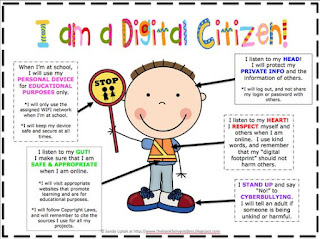Digital Citizenship for Kindergarten Students
Teaching Digital Citizenship to Kindergarten Students
As a career high school teacher, I am quite accustomed to teaching digital citizenship in Grades 9-12. I wanted more information on teaching to a much younger audience. Radical digital citizenship is "a process by which individuals and groups committed to social justice critically analyze the social, political and economic consequences of digital technologies in everyday life and collectively deliberate and take action to build alternative and emancipatory technologies and technological practices" (Emejulu & McGregor, 2016, p. 10). What does the preceding definition mean to a five-year old student? The web article refers to three main considerations for teacher. First, knowing how to handle strangers in virtual environments. Second, to convey that not all strangers are dangerous. Third, the danger might be in the home and hard to escape. What role do parents take in these responsibilities? As a parent, am I sending to school a five year old who has access to a tablet, a Smartphone, or a computer? If so, I must educate my child as well. How many parents know exactly what their child is viewing on technological devices? Teachers need supports from Kindergarten to Grade 12. Digital citizenship cannot begin in high school; education must start early at school and at home.
My attached picture acts as a reminder for students; it would make an effective classroom poster as well. I would like feedback and commentary from primary teachers. What do they observe in earlier grades.
As a career high school teacher, I am quite accustomed to teaching digital citizenship in Grades 9-12. I wanted more information on teaching to a much younger audience. Radical digital citizenship is "a process by which individuals and groups committed to social justice critically analyze the social, political and economic consequences of digital technologies in everyday life and collectively deliberate and take action to build alternative and emancipatory technologies and technological practices" (Emejulu & McGregor, 2016, p. 10). What does the preceding definition mean to a five-year old student? The web article refers to three main considerations for teacher. First, knowing how to handle strangers in virtual environments. Second, to convey that not all strangers are dangerous. Third, the danger might be in the home and hard to escape. What role do parents take in these responsibilities? As a parent, am I sending to school a five year old who has access to a tablet, a Smartphone, or a computer? If so, I must educate my child as well. How many parents know exactly what their child is viewing on technological devices? Teachers need supports from Kindergarten to Grade 12. Digital citizenship cannot begin in high school; education must start early at school and at home.
My attached picture acts as a reminder for students; it would make an effective classroom poster as well. I would like feedback and commentary from primary teachers. What do they observe in earlier grades.

Interesting considerations. The idea of danger reminds me of an article I read a couple of months ago that was all about re-thinking "stranger danger" and how we teach this idea to children. The premise was that sometimes strangers are the ones that a child will need to go to for help, so teaching children to fear everyone who is unfamiliar is likely not helpful. Instead, the article focused on teaching children about "tricky" people and how they might try to lure children to them, for example by asking if the child wants to see their pet, asking the child for help, etc. I thought it was an interesting take on an old idea.
ReplyDeleteThe third point makes me a bit sad, and is a good reminder for us that many of our students are coming from very challenging situations that they really aren't equipped to deal with. If a child is living in a dangerous or toxic situation at home, clearly their main concern is trying to remain safe, and not learning about how to be a good digital citizen.
Side note: I feel like I should hang this poster up in my high school classroom, as some of my students have likely not learned these principles, or have forgotten them :)